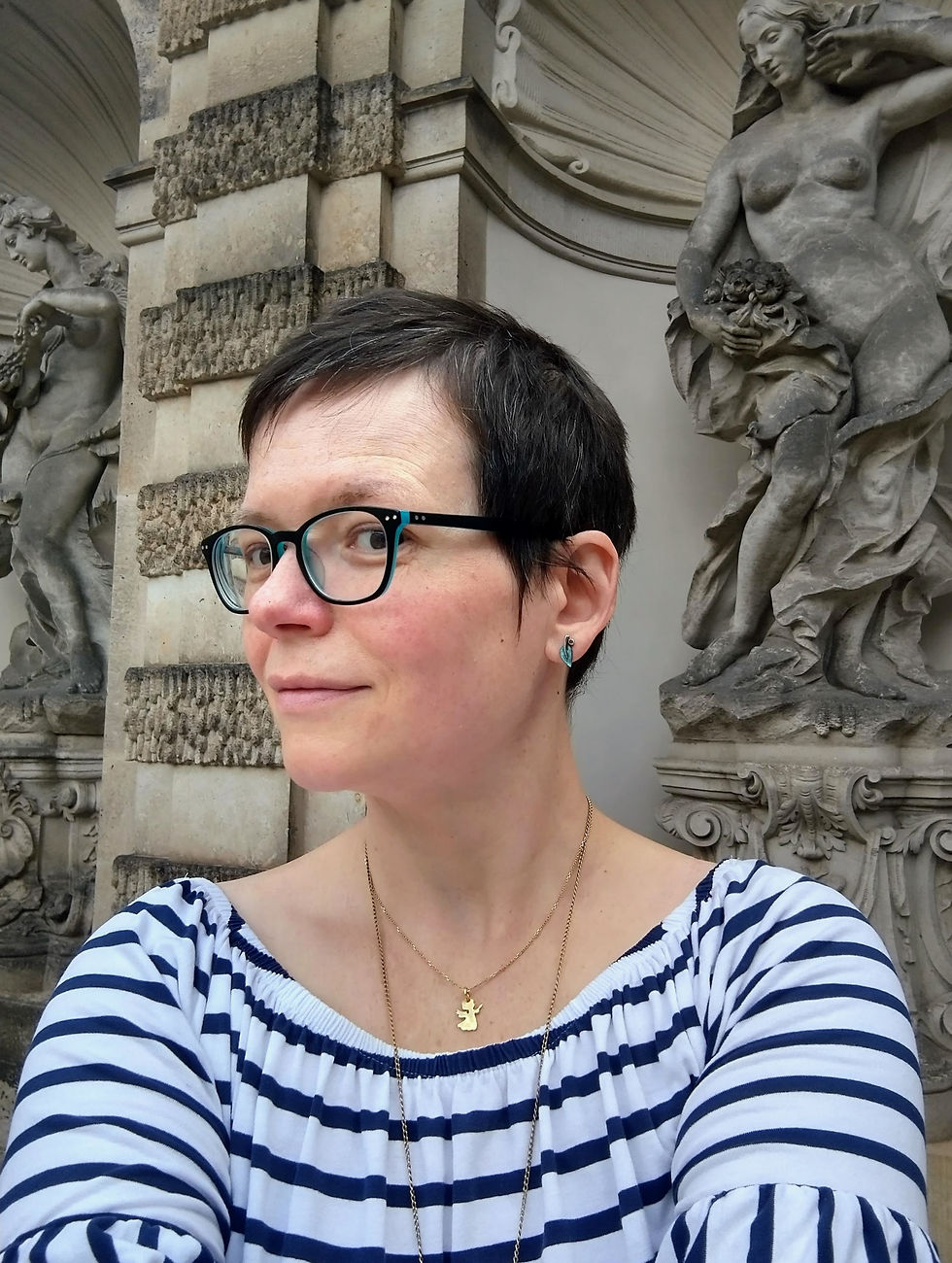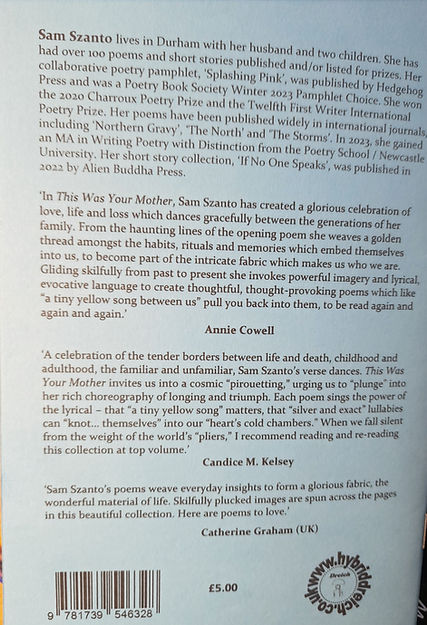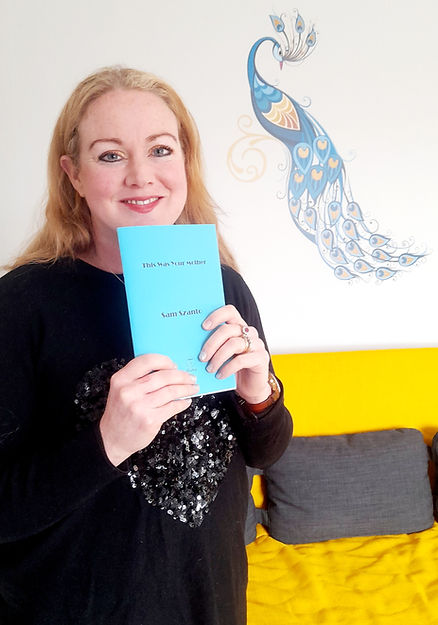20 Questions with... Marie Isabel Matthews-Schlinzig
- samszanto2
- Nov 26, 2022
- 6 min read
Updated: Dec 15, 2022

Marie Isabel Matthews-Schlinzig writes poetry, flash fiction, reviews, and essays. Her work has been published in print and online by Dreich, Nine Pens, Speculative Books, The Common Breath, and Visual Verse, among others. Recent publications include the pamphlet kinscapes and the poetry anthology The Joy of Living (both out with Dreich, 2022). MIMS lives in Dunfermline, Scotland, with her mensch, Tobi the dog, and far too many books.
Twitter: @whatisaletter
Instagram @schicketanz_books, @whatisaletter
Please introduce yourself. Where are you from? What was your life like growing up?
I was born in East Germany. My childhood was shaped by the country’s politics – nobody escapes an authoritarian state – and therefore lacked many of the freedoms and opportunities a lot of people growing up in the West could take for granted. But I was also lucky: I felt loved, and we weren’t poor. I had access to books – at home, in libraries, at school. Plus: German reunification happened when I was still young enough to grow into and adapt to this new world and go through quite a few of the doors history (as well as my family) had opened for me. It wasn’t an easy time, but in retrospect I appreciate that my early years coincided with a period of such extraordinary historical change.
Did you always want to be a writer? If you also work, what do you do / did you do?
I’ve written poems, short stories, longer prose texts ever since I learnt how to shape letters on the page into words. However, only in recent years I’ve found the confidence to take my writing seriously. In professional terms, I am what a so-called ‘recovering academic’: after teaching and researching at various universities for many years, I now work as a freelance editor, translator, and author (in English and German).
Tell us about your most recently published work in a sentence.
kinscapes is a poetry pamphlet that – by drawing on my experience as an immigrant in Scotland – explores facets of what we call ‘home’ and ‘kinship’.
What are you working on right now?
I’m working on an eco-poem in response to a call by an indie publisher I like and with whom I’ve been able to place work in the past. I’ve also got quite a few drafts in urgent need of revision. Some of these relate to what I think might be my next long-term project: an exploration of the relationship between individual (family) history and general (world) history through specific moments in time – hopefully in ways that are both formally inventive and fun.
Do you have a writing routine, and if so, what is it?
I wish! I started the year with good intentions: set aside at least ten minutes a day to write creatively. And that’s what I did for quite a few months, and often ended up writing longer. But due to a range of circumstances I couldn’t stick to this routine (life got in the way, basically). In the past few months, I’ve been primarily writing in bursts, whenever I got a focused moment. But I stick to at least one routine: I create bimonthly posts for my Patreon account (https://www.patreon.com/whatisaletter), and they usually include a draft of at least one new poem.
Where do you write – always in the same space, or different places? Can you write ‘on the move’?
I can write pretty much anywhere: when out walking the dog, on the bus, at home on the couch (like now), at the kitchen table, in the garden, in cafés. It’s not primarily a physical place I write from – or towards, it’s a state of mind.
What advice do you have for other authors who are starting out? What is the best advice you’ve heard?
Believe in yourself, in your writing, and keep at it. Connect with other writers. Plus (and this goes back to a piece of advice I was given when I was much younger but which I understood only much later): read, as much and as widely as you can. Read both for pleasure and to learn from other writers. Over time, you’ll be able to identify better and better what kind of people and books you need to further develop your own work. Lastly: pay attention to yourself, your surroundings, the world at large – everything can turn into a poem, a story, or whatever takes your fancy: you just need to really look!
Do you enjoy doing live readings or are they a necessary evil – or somewhere in between?
To be honest, I’ve only read live one time so far, and I was terribly nervous (I’ve always been afflicted by bad stage fright, even when giving lectures at university). Having said that: I absolutely loved it! Reading my work in front of an appreciative audience is the best feeling.
Are there recurring themes in your work? Where do you feel these emanate from if so?
My writing and the themes that shape it are still very much in the process of emerging, but the following come to mind now: ‘portraits’ in the widest possible sense of the word (of people, places, images); ‘origins’ (including the connected themes of home, [forced] migration, etc.); as well as ‘animals’ and ‘nature’. Some of these themes emanate from personal experience, others from family history, and yet others from things I’ve read and keep thinking about.
Should writers have a moral purpose? What is the purpose of a writer in today’s society?
Having a moral purpose means different things to different people. I wouldn’t want to prescribe how others see their purpose as writers. My roundabout answer is: it helps to have integrity, look at what is happening around you with a reflecting, critical eye, and produce work to the best of your abilities, bearing in mind where your own writing is coming from, e.g. in terms of cultural background, and what you might want to achieve with it.
Do you write between genres or not?
I’m working on it.
Which living writers do you most admire?
When it comes to living writers/poets, the first person I think of right now of is Roger Robinson, simply because of the brilliance of his collection A Portable Paradise; Louise Glück is another – but there are many others I admire, too many to name them all.
Which dead writers do you most admire?
I love too many writers/books for too many different reasons and therefore find it impossible to choose one over the others. An author whose work I fell in love with recently is Helga Schubert; her latest, autofictional book Vom Aufstehen (loosely translated: ‘Of Rising’) just blew me away.
What’s the book you wish you’d written?
Again, I sort of want to refuse to answer, but one such book is Virginia Woolf’s Mrs Dalloway – oh, and of course quite a few of Emily Dickinson’s poems.
What other external influences do you have: nature, place, music, etc.?
Nature is definitely a great influence. Art is another. Memory. Everyday life: newspaper reports, conversations, etc. Anything and everything that has – as another writer once said – a certain ‘energy’ can become the portal to a new piece of work.
Do you suffer from ‘writer’s block’ and how do you overcome it if so?
Yes, I think I sometimes do, or if not from ‘writer’s block’ then from a certain inertia, or a desperate aimlessness that doesn’t quite know where to turn next. What helps me is in such situations is automatic or flow writing: I aim at writing down everything that comes to mind for ten minutes or so. In one way or another, this often helps me to get ‘unstuck’.
What’s been your favourite reaction to your writing?
There’ve been several, the most recent reaction comes from the first longer review of ‘kinscapes’ (written by Charlotte Gann, published by Sphinx). It says that I ‘[have] this way of looking — as though through [my] microscope, or maybe, sometimes, telescope, or even both at once!', and also uses the word ‘lense’. As someone who loves to observe up close as well as from a distance and adores taking photographs, I feel really seen as a poet by these remarks.
How do your family and friends feel about your writing?
My friends are wonderfully supportive. Some of my family members are, too, but not all of them can read my recent work, because they don’t speak English. Not being able to share this with them is hard.
Do you have a favourite bookshop?
I’m still looking (particularly in Edinburgh, which boasts lots of good bookshops, Golden Hare Books, for instance). One place even closer to home which I cherish is the ‘Little Shop of Heroes’, a comic bookstore in Dunfermline.
How do you see the future of writing? Will we become more or less dependent on Amazon?
I’m not sure about the role Amazon will play since I have no experience with it from a writer’s point of view. I think the future of writing will be both bright and difficult: bright because more, and more diverse voices are being heard, difficult, because there is still a lot of gatekeeping that makes it hard for someone without the right connections to become established as a writer. Plus: you need to be able to afford the time and space to write, and it remains, for many, a precarious business.










Comments